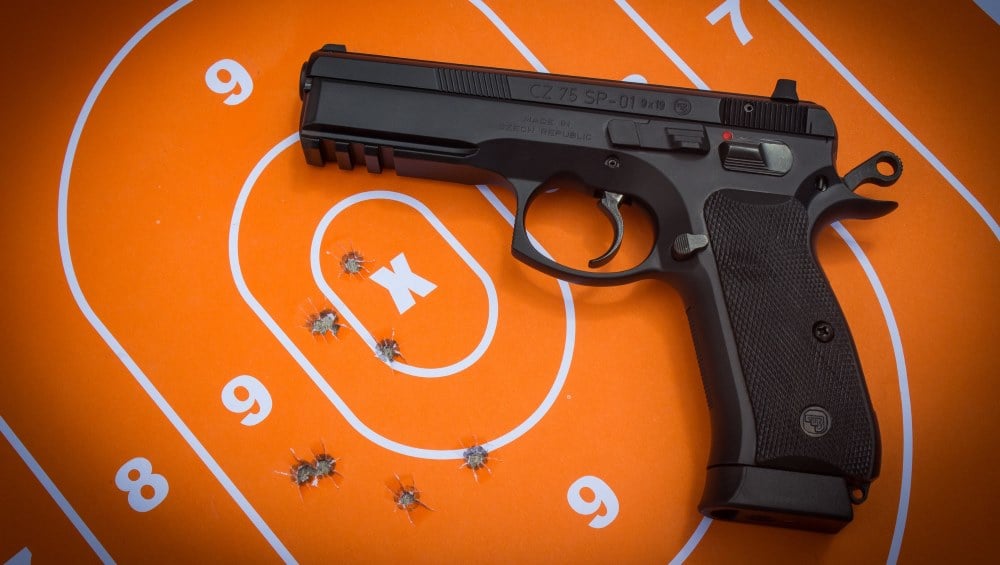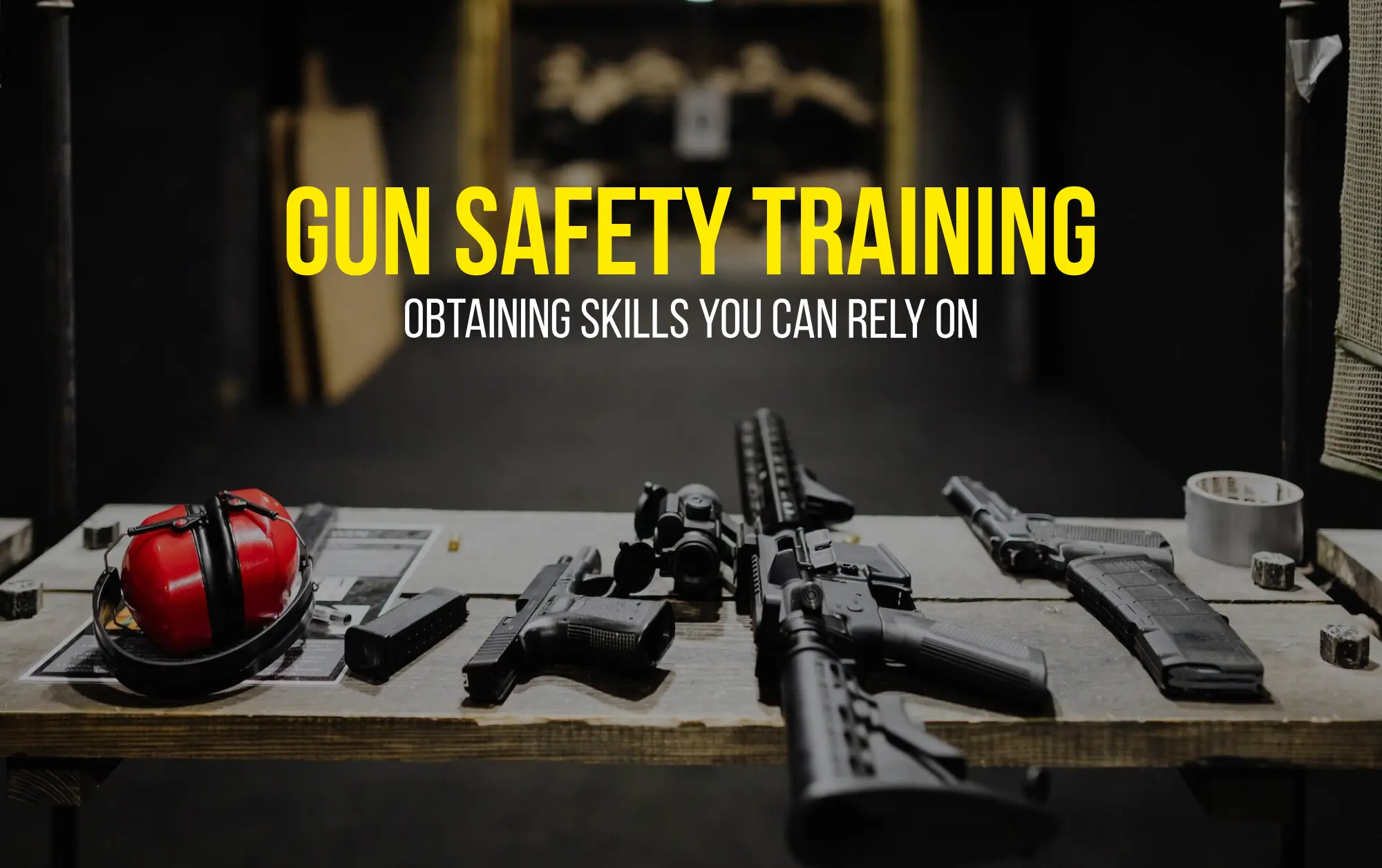Before we begin, here’s some sad statistics:
- Daily in the U.S., over 120 people are fatally shot, double that number are wounded, and numerous others are affected by gun violence.
- Annually, guns claim more than 43,000 lives in the U.S., with homicides accounting for 40% of these deaths.
- Almost 4,000 children and teens (aged 0-19) are killed by gunfire each year, with an additional 15,000 wounded.
- 39% of gun owners have no gun safety training.
If you’ve decided to own a firearm, the first thing crucial to understand is that you are responsible for educating yourself on safe practices for handling and using your gun, regardless of whether your state laws require firearm training before purchase.
The internet is awash with articles and videos breaking down the basics of firearm safety and self-defense for beginners. However, watching and reading about it doesn’t translate to a solid understanding and automatisms. For this reason, we won’t be discussing safe practices in this article but rather provide reasons why taking a gun training course is important. Let’s begin.

Gun training teaches you essential safety principles
The first reason why gun training is a must for everyone is that it educates on how to handle, use, carry, store, maintain, and transport your firearm safely and provides supervised hands-on learning.
Without adequate gun safety knowledge, your firearm can easily go from being a tool of protection to a risk factor in your home or community. For instance, take the basics – the four rules of gun safety:
- Handle all firearms as if loaded and keep your gun unloaded when not in use.
- Always keep the muzzle pointed in a safe direction.
- Keep your finger off the trigger until you’ve decided to shoot.
- Identify your target and its surroundings (what’s before, beyond, and on the sides).
These rules may seem simple on paper, but they’re not always easy to follow in a real-world situation. In our pistol training classes at GRITR Range, we’ve seen beginners accidentally crossing their wrists over the muzzle line during holstering or pointing the pistol to the side to rack the slide without checking if it’s a safe direction. Similarly, in rifle training courses, it’s common to see trainees forget to clear the chamber when unloading their AR-15s, thereby violating the first rule of gun safety.
This is where gun safety training proves invaluable. A trained instructor can provide real-time feedback, helping you develop safe habits and avoid forming bad or dangerous ones. In other words, gun safety training reduces accidents.
Gun training explains gun components and their functions
Next, firearm training also allows you to familiarize yourself with the operation of a gun and its parts in a safe environment.
Take semi-automatic pistols. While the basics of operation remain the same across models, there will always be differences in location of knobs and levers, adjustment of mechanisms, presence/absence of particular parts, and so on. For instance, some have the manual safety, while others, like the SIG P320 and Glock pistols, have only internal safeties. Understanding safety mechanisms can prevent negligent discharges when carrying or cleaning a gun.
If you’ve already purchased a gun, another reason why gun training is important is that you’ll learn the anatomy and operation of YOUR firearm, which will ease the transition to using it in daily life without supervision.
GRITR shooting range (located in North Richland Hills, DFW) offers two options for beginners. You can take a handgun course with your gun or with one of our rental guns. The same goes for our basic rifle training course.
Basic Handgun Safety
Basic Handgun Safety (w/ Rental)
Basic Rifle Safety
Basic Rifle Safety (w/ Rental)
Gun training improves confidence
One common sign that someone is uncomfortable with shooting a gun is flinching, involuntary movement just before the gun fires. It’s a natural response to the loud noise and recoil. However, flinching can significantly affect your aim and accuracy. In a defense situation, where precision is critical, flinching can lead to missing the target entirely, potentially leading to harmful consequences.
The initial shock of firing a gun often fades with frequent practice. At a shooting range, under the supervision of a trained instructor, you’ll learn to shoot without flinching. They’ll guide you through various exercises designed to improve your confidence and comfort with the firearm.
Gun training prepares you for defense situations
In high-stress situations, even the most experienced individuals can make mistakes. So, one more reason why gun training is important is that it teaches you how to respond to violent encounters effectively.
One of the key aspects of gun safety training is scenario-based exercises – home invasion, self-defense, active shooter, etc. These exercises provide a hands-on experience of what you might encounter in real life, putting you under pressure and helping enhance your decision-making skills. It’s one thing to know how to use a firearm, but it’s another thing entirely to know how to use it effectively under stress.
Also, some gun training classes educate you on maintaining overall situational awareness. You’ll become more adept at noticing general safety hazards, such as an improperly stored firearm or a potential threat in your environment.
At GRITR Range, we offer several courses designed to educate you on what to do in a defense situation. Some of our courses are more theoretical, while others are more practical, providing hands-on training at our shooting range.
Intro to Defensive Shooting
Gun training guides you through firearms laws
Owning a firearm is a right that comes with a multitude of legal obligations. For instance, in many jurisdictions, completing a gun safety training course is mandatory for obtaining a firearm license.
Local, state, and federal laws related to firearms can be intricate and multifaceted. Proper gun safety training provides education about these laws, helping gun owners avoid potential legal issues down the line.
The training encompasses a wide range of topics, from the legalities of firearm use in self-defense situations and transportation of firearms to necessary reporting procedures in case of theft or loss. Understanding these aspects is crucial to ensure you’re not unintentionally violating any laws when handling your firearm.
Gun training teaches you the basics of shooting
Through gun training courses, you can master the shooting basics and improve your accuracy, minimizing the risk of collateral damage and saving bullets in the process.
Gun safety training typically includes practical shooting exercises designed to enhance your accuracy and safe handling skills. These exercises teach you about the proper grip, stance, and trigger pull, which is beneficial whether you intend to use your firearm for self-defense, hunting, or target shooting.
Gun training educates you on gun accessories
One of the most overlooked benefits of gun training is the expert advice it provides on selecting and using gun accessories like holsters, optics, aiming devices, and more. During your training, experts in the field will guide you through picking suitable accessories for your specific firearm and needs. They’ll take into consideration factors such as your firearm model, your shooting style, and your comfort level, ensuring that the accessories you choose complement your set-up rather than hinder it.
Each of our gun training courses includes a module dedicated to gear and gadgets. But we also take great pride in offering a class entirely dedicated to night vision optical devices and the techniques for manipulating a weapon under these devices. This specialized training is particularly beneficial for those planning to use their firearms in low-light conditions, whether for hunting or tactical scenarios.
Intro to Night Vision
Final Thoughts
So, why is firearm training important? The answer lies in undeniable benefits. First of all, it creates a safer, more informed community where the right to bear arms is exercised with utmost responsibility and respect. It extends beyond simply learning how to operate a gun, providing gun owners with a comprehensive understanding of safe, effective, ethical, and legal firearm usage. It’s about mastering a multitude of skills, knowing when and how to use a firearm in different situations, and understanding the gravity of gun ownership.
FAQ
Gun safety training is essential to prevent accidents and ensure the responsible use of firearms. It teaches individuals how to handle guns safely, understand the laws regarding firearm use, and develop the skills necessary for self-defense, hunting, or sport shooting.
Anyone who plans to own, operate, or be around firearms should undergo gun safety training. This includes new gun owners, individuals seeking permits, recreational shooters, and those interested in self-defense.
Initial gun training provides a fundamental understanding of firearm safety and operation. However, regular refresher courses or practice sessions are recommended to maintain proficiency and stay updated on best practices and laws.
Yes, there are various levels of gun training available, including beginner, intermediate, and advanced courses, as well as specialized training for specific types of firearms or shooting disciplines.
While some theoretical aspects of gun safety can be learned online, practical hands-on training and live-fire exercises require in-person attendance. Always ensure that the online component is complemented with actual firearm handling under professional supervision.
Not necessarily. Many training facilities provide rental firearms for students to use during their courses. However, training with your own firearm can be beneficial since it allows you to become familiar with its specific mechanics and feel.
Laws vary by location, but some states or countries require proof of gun safety training before issuing a firearm license or permit. Even if not legally required, it’s highly encouraged for responsible ownership.
In a gun safety course, you’ll learn firearm laws, the parts and operation of firearms, the fundamentals of shooting, safe storage and handling, and how to respond to gun malfunctions.


